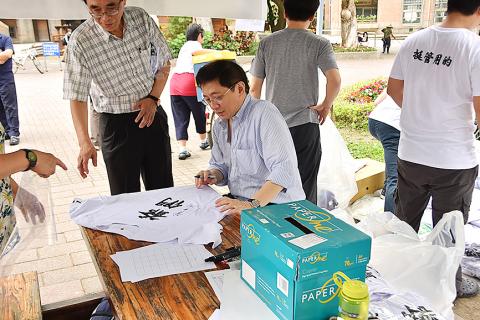The Ministry of Education last night announced that due to concerns over failures to avoid conflicts of interest, it has decided not to approve the appointment of National Taiwan University (NTU) president-elect Kuan Chung-ming (管中閔).
The decision came more than three months after Kuan was elected by the NTU election committee as the university’s president. Kuan was originally scheduled to take office on Feb. 1.
While campaigning, Kuan did not reveal he was a Taiwan Mobile (台灣大哥大) independent director, among other posts, Deputy Minister of Education Lin Teng-chiao (林騰蛟) said.

Photo: Wu Po-hsuan, Taipei Times
Taiwan Mobile vice chairman Richard Tsai (蔡明興), who was on the committee, also failed to avoid a conflict of interest, he said.
NTU did not fulfill its responsibilities in the election, resulting in a competition that was unfair and biased against other candidates, he added.
At the same time, a situation in which academic integrity was obviously breached also emerged, Lin said, referring to accusations of plagiarism by Kuan.
The university’s presidential election is to return to its initial stage of reviewing the qualifications of recommended candidates, he said.
The ministry said it has asked NTU and the committee to report after they have carried out a complete recommendation and election process that meets the requirements set by the university.
Kuan did not respond to requests for comment as of press time last night.
Since his election on Jan. 5, Kuan has been accused of plagiarism and having a conflict of interest, which initially cast doubt on the legitimacy of his selection and prevented the ministry from confirming his appointment with effect from Feb. 1 as scheduled.
The university eventually cleared Kuan of the accusations, but last month allegations surfaced of him teaching illegally in China since 2005.
Earlier this month, the ministry assembled a task force to investigate whether Kuan had been working in China — a breach of Taiwan’s laws, which prohibit government officials, public servants and public-school teachers from working in China.
Kuan served as a minister without portfolio from 2012 to 2015, Council for Economic Planning and Development minister from 2013 to 2014 and National Development Council minister from 2014 to 2015.

PREPAREDNESS: Given the difficulty of importing ammunition during wartime, the Ministry of National Defense said it would prioritize ‘coproduction’ partnerships A newly formed unit of the Marine Corps tasked with land-based security operations has recently replaced its aging, domestically produced rifles with more advanced, US-made M4A1 rifles, a source said yesterday. The unnamed source familiar with the matter said the First Security Battalion of the Marine Corps’ Air Defense and Base Guard Group has replaced its older T65K2 rifles, which have been in service since the late 1980s, with the newly received M4A1s. The source did not say exactly when the upgrade took place or how many M4A1s were issued to the battalion. The confirmation came after Chinese-language media reported

A Ministry of Foreign Affairs official yesterday said that a delegation that visited China for an APEC meeting did not receive any kind of treatment that downgraded Taiwan’s sovereignty. Department of International Organizations Director-General Jonathan Sun (孫儉元) said that he and a group of ministry officials visited Shenzhen, China, to attend the APEC Informal Senior Officials’ Meeting last month. The trip went “smoothly and safely” for all Taiwanese delegates, as the Chinese side arranged the trip in accordance with long-standing practices, Sun said at the ministry’s weekly briefing. The Taiwanese group did not encounter any political suppression, he said. Sun made the remarks when

The Taiwanese passport ranked 33rd in a global listing of passports by convenience this month, rising three places from last month’s ranking, but matching its position in January last year. The Henley Passport Index, an international ranking of passports by the number of designations its holder can travel to without a visa, showed that the Taiwan passport enables holders to travel to 139 countries and territories without a visa. Singapore’s passport was ranked the most powerful with visa-free access to 192 destinations out of 227, according to the index published on Tuesday by UK-based migration investment consultancy firm Henley and Partners. Japan’s and

BROAD AGREEMENT: The two are nearing a trade deal to reduce Taiwan’s tariff to 15% and a commitment for TSMC to build five more fabs, a ‘New York Times’ report said Taiwan and the US have reached a broad consensus on a trade deal, the Executive Yuan’s Office of Trade Negotiations said yesterday, after a report said that Washington is set to reduce Taiwan’s tariff rate to 15 percent. The New York Times on Monday reported that the two nations are nearing a trade deal to reduce Taiwan’s tariff rate to 15 percent and commit Taiwan Semiconductor Manufacturing Co (TSMC, 台積電) to building at least five more facilities in the US. “The agreement, which has been under negotiation for months, is being legally scrubbed and could be announced this month,” the paper said,